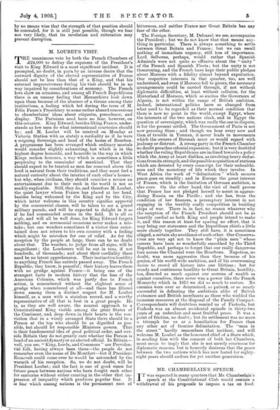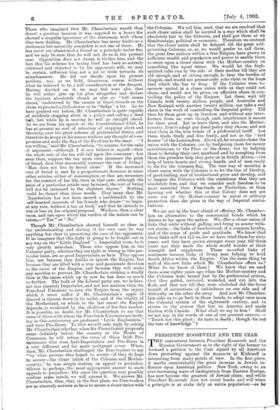MR. CHAMBERLAIN'S SPEECH.
IT was expected in many quarters that Mr. Chamberlain's speech at the Constitutional Club would contain a withdrawal of his proposals to impose a tax on food. Those who imagined that Mr. Chamberlain would thus desert a position because it was exposed to a heavy fire showed a singular ignorance of the statesman with whom they were dealing. Mr. Chamberlain has many faults as a statesman but assuredly cowardice is not one of them. He has never yet abandoned a friend or a principle under fire, and we may be sure that he will not do so in the present ease. Opposition does not daunt, it vivifies him, and the fact that his scheme for taxing food has been so severely criticised and objected to by his opponents will, we may be certain, influence him not a jot or tittle towards its abandonment. He did not decide upon his present perilous, nay, as we hold, disastrous, course without what he believed to be a full consideration of the dangers. Having decided on it, we may feel sure also that he will either give up his plan altogether and declare the incident absolutely closed, or else go " full steam ahead," undeterred by the shouts of timid friends on the shore to proceed a little slower or to "hedge" a bit. As we have pointed out before, Mr. Chamberlain is quite capable of suddenly stopping short in a policy and calling a dead halt, but while he is moving he will go straight ahead. As we see from his speech at the Constitutional Club, he has at present no sort of intention of stopping short and throwing over his great scheme of preferential duties, and therefore he keeps on his course without any thought of com- promise and nails the flag of the Food-tax to the mast. "I am willing," said Mr. Chamberlain, "to assume, for the sake of argument—although I do not believe it myself—that the whole cost of the tax will fall upon the consumer ; but even then, suppose the tax upon corn increases the price of bread, does that necessarily increase the cost of living? Man does not live by bread alone.' If the increased cost of bread is met by a proportionate decrease in some other articles, either of consumption or that are necessary for the comfort of his life, then in that case, although the price of a particular article may be raised, the cost of living will not be increased in the slightest degree." Nothing lould be clearer than these words. They mean that Mr. chamberlain has not been moved a hairbreadth by the aalf-hearted counsels of his friends who desire "to begin, at any rate, without a tax on food," and that he intends to win or lose on his original proposal. We have, then, a clear issue, and one upon which the verdict of the nation can be taken,—" Yes" or "No."
Though Mr. Chamberlain showed himself so clear in the understanding and stating of his own case, he was anything but clear in presenting the case of his opponents. If he imagines that this fight is going to be fought out in any way on the "Little England" v. Imperialist issue, he is very greatly mistaken. Those who oppose him in the Unionist party, whether they are right or wrong in this par- ticular issue, are as good Imperialists as he is. They oppose him, not because they dislike or ignore the Empire, but because they are filled with a true and passionate devotion to the cause of the Empire, and because they will make any sacrifice to prevent Mr. Chamberlain striking a deadly blow at the cause which up to now he has done so much to further. The bulk of the Liberal party are, we believe, not less sincerely Imperialist, and not less anxious than the Free-food Unionists to save the Empire from the injury which it must suffer if Mr. Chamberlain's apple of discord is thrown down in its midst, and if the vitality of the Motherland, on which in the last resort the Empire depends, is weakened by the abolition of her free market. It is possible, no doubt, for Mr. Chamberlain to say that some of those with whom the Free-trade Unionists are work- ing in this controversy are professed "Little Englanders," and were Pro-Boers. To that we will only reply by asking Mr. Chamberlain whether, when his Protectionist proposals come definitely before the country or the House of Commons, he will refuse the votes of those Irish Pro- tectionists who were Anti-Imperialists and Pro-Boers in a very different and far more malignant sense. When, then, Mr. Chamberlain challenged the Free-traders to say "by what process they hoped to secure—if they do hope to secure—the closer union of the Colonies and Mother- country," he was simply making an appeal to prejudice. Silence is, perhaps, the most appropriate answer to such appeals to prejudice ; Mit since the question may possibly confuse some minds, we will answer it. We answer Mr. Chamberlain, then, that, in the first place, we Free-traders are as sincerely anxious as he is to secure a closer union with the Colonies. We tell him, next, that we are resolved that such closer union shall be secured in a way which shall be absolutely fair to the Colonies, and shall put them at no disadvantage, political or economic. Therefore we contend that the closer union shall be delayed till the great self- governing Colonies, or, as we would prefer to call them, the t'°Teat free nations within a free Empire, have grown to sufficient wealth and population and power to enable I them to enter upon a closer union with the Mother-country on something like equal terms. We would let the high- spirited colts run by the side of their mother till they are old enough, and so strong enough, to bear the burden of Empire, and would not prematurely yoke them to the huge load which she has to drag. If the Colonies were to- morrow united in a closer union with us they could not claim, and would not be given, ea effective share in con- trolling the policy of the Empire. Let them wait till Canada with twenty million people, and Australia and New Zealand with another twenty million, can take a real share in the work of controlling the Imperial policy. Till then let them grow up in freedom and without any inter- ference from us, even though such interference is meant for their good. Let us leave them, and also the Mother- country, free to adopt any fiscal policy they choose, and not bind them in the iron bonds of a preferential tariff. Let them trade freely and live freely, and not as the tied houses" of the London firm. Above all, let us make closer the union with the Colonies, not by badgering them for money contributions to the Fleet or the Army, but by helping them to develop their own manhood and by accepting from them the priceless help they gave us in South Africa,—the help of brave hearts and strong hands, and of men ready to die for the common flag. The best way of securing a closer union with the Colonies is to let the ties of kinship, of good-feeling, and of brotherhood grow and develop, and to inspire the Colonies with the confidence that they are absolutely free, and that we consider such freedom to be more essential than Free-trade or Protection, or than figuring out whether this or that Colony does not get more out of the Mother-country in naval or military protection than she gives in the way of Imperial contri- butions.
We are not in the least afraid of offering Mr. Chamber- lain an alternative to the commercial bonds which he desires to lay upon the nation. We offer a closer union of links that unite without galling and bring us nearer with- out strain,—the links of brotherhood, of a common loyalty, and of the sense of pride and gratitude. We know that these links will not fail us, for we have tried them for sixty years, and they have grown stronger every year, till three years ago they made the whole world wonder at their strength and suppleness. These so-called links of sentiment became links of living men helping to hold South Africa within the Empire. Can the same thing be said of the new links which Mr. Chamberlain offers us ? What do we know of them ? We blow that we used them some eighty years ago when the Mother-country and the Colonies were bound fast by the preferential system, that they galled, irritated, wounded, and cut into the flesh, and that not till they were abolished did the fierce tumult of accusations of unkindness on one side and of disloyalty on the other die away. And now Mr. Chamber- lain asks us to go back to those bonds, to adopt once more the Colonial system Of the eighteenth century, and to return to the system that lost us America and made friction with Canada. What shall we say to him ? Shall we not say, in the words of one of our greatest orators :— " Touch not this plant ; its taste is death ; though 'tis not the tree of knowledge "P











































 Previous page
Previous page